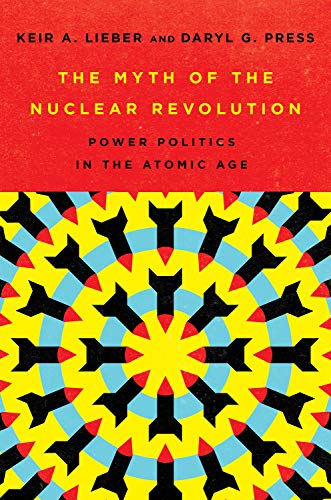To sign up for the event, please register here .
Event description: Book discussion on "The Myth of the Nuclear Revolution: Power Politics in the Atomic Age" (Cornell University Press, 2020). Coffee and fruit will be served at the event.
Speaker: Prof. Keir Lieber, Professor in Georgetown University's School of Foreign Service and Department of Government
Discussants:
- Dr. Kristin Ven Bruusgaard (Director, Norwegian Intelligence School)
- Dr. James Cameron, Post-Doctoral Fellow/Assistant Professor, Oslo Nuclear Project, University of Oslo
- Dr. Do Young Lee, Post-Doctoral Fellow/Assistant Professor, Oslo Nuclear Project, University of Oslo
Chair: Prof. Målfrid Braut-Hegghammer, Professor at the University of Oslo & Director, Oslo Nuclear Project
Book Description:
Leading analysts have predicted for decades that nuclear weapons would help pacify international politics. The core notion is that countries protected by these fearful weapons can stop competing so intensely with their adversaries: they can end their arms races, scale back their alliances, and stop jockeying for strategic territory. But rarely have theory and practice been so opposed. Why do international relations in the nuclear age remain so competitive? Indeed, why are today's major geopolitical rivalries intensifying?
In The Myth of the Nuclear Revolution , Keir A. Lieber and Daryl G. Press tackle the central puzzle of the nuclear age: the persistence of intense geopolitical competition in the shadow of nuclear weapons. They explain why the Cold War superpowers raced so feverishly against each other; why the creation of "mutual assured destruction" does not ensure peace; and why the rapid technological changes of the 21st century will weaken deterrence in critical hotspots around the world.
By explaining how the nuclear revolution falls short, Lieber and Press discover answers to the most pressing questions about deterrence in the coming decades: how much capability is required for a reliable nuclear deterrent, how conventional conflicts may become nuclear wars, and how great care is required now to prevent new technology from ushering in an age of nuclear instability.
Speaker bio:
Dr. Lieber is a Professor in Georgetown University's School of Foreign Service and Department of Government. He served as Director of the Security Studies Program from 2018-2022. He received his Ph.D. and MA in political science from the University of Chicago, and his BA in political science and international relations from the University of Wisconsin-Madison. Lieber's research and teaching interests include nuclear weapons, deterrence, and strategy; technology and the causes of war; US national security policy; and international relations theory. He is co-author (with Daryl Press) of The Myth of the Nuclear Revolution: Power Politics in the Atomic Age (Cornell University Press, 2020); author of War and the Engineers: The Primacy of Politics over Technology(Cornell University Press, 2005); and editor of War, Peace, and International Political Realism (University of Notre Dame Press, 2009). His articles have appeared in leading scholarly and foreign policy publications, including International Security , Security Studies , Foreign Affairs , and the Atlantic Monthly . He has been awarded major fellowships from the Brookings Institution, Carnegie Corporation of New York, Council on Foreign Relations, and Smith Richardson Foundation.
